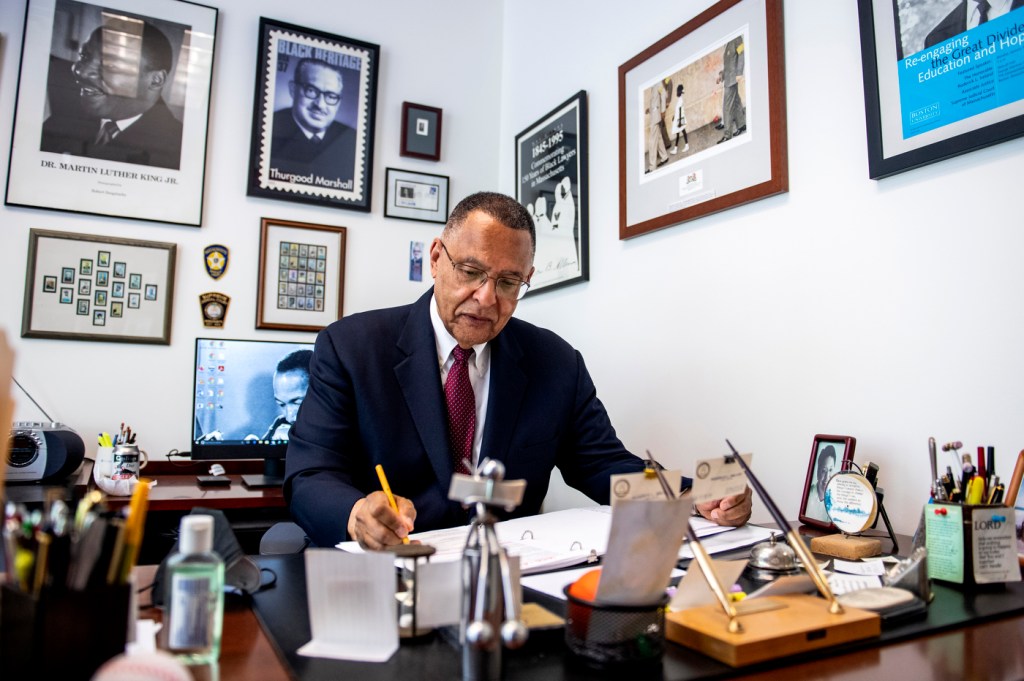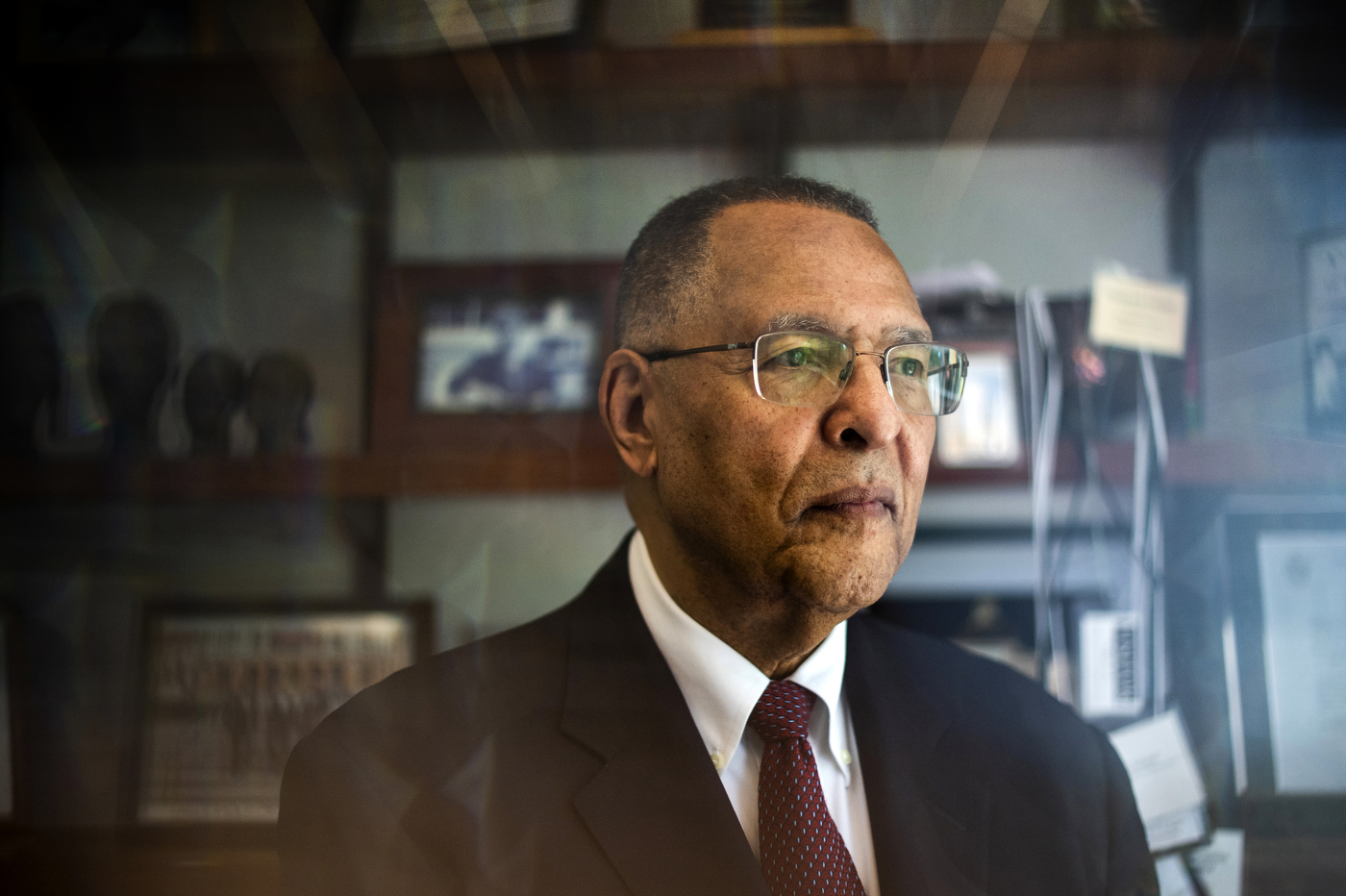From LGBTQ liberties to police reform, Judge Roderick Ireland has seen it all

To say that Roderick Ireland’s career has been storied is like saying a library is storied—it’s true, but it doesn’t do justice to the breadth and depth contained within.
The first Black justice on the Massachusetts Supreme Judicial Court, and later its first Black chief justice, Ireland has presided over a number of landmark cases in his 37-year career as a judge in the state. Perhaps most notably, Ireland was a member of the four-justice majority in a case called Goodridge v. Department of Public Health. The 2003 case established Massachusetts as the first state in the country to legalize same-sex marriage, and set in motion a domino-effect of other states that passed similar laws in the years that followed.

Goodridge, as it’s known among scholars and armchair historians of LGBTQ rights, was a monumental decision, one that ultimately paved the way for nationwide marriage equality in the United States. But ask Ireland which cases stand out among the many he’s heard, and he’ll recall cases from early in his career as a juvenile court judge alongside Goodridge.
“I’m proud of every case I sat on,” he says. “I often tell people when I think about my judicial career, the cases that really stand out tend to be when I was a trial court judge, making decisions about custody of children. Those cases stand out as much as the Goodridge case—those were real children with real lives, and I knew that any decision I made would impact this child, this family. They were very important to those people.”
Ireland, who is a distinguished professor of criminology and criminal justice at Northeastern, began his legal career in 1969 as a neighborhood legal services attorney. In 1971, he and Wallace Sherwood, an attorney who also taught in Northeastern’s School of Criminology and Criminal Justice, founded the Roxbury Defenders Committee, a free public defender program. Prior to its creation, there was no public defender’s office in Roxbury. People in the Boston neighborhood received legal representation from the Massachusetts Defenders Committee.
He served as a judge for the Boston Juvenile Court from 1977 to 1990, then sat on the Massachusetts Appeals Court from 1990 to 1997. In 1997, he was appointed to the Massachusetts Supreme Judicial Court, and in 2010, he was named by then-Gov. Deval Patrick as its chief justice. He served in that role until 2014, when he turned 70, the state’s mandatory retirement age for judges.
Ireland has taught at Northeastern throughout his time as a judge, as well, teaching at both the School of Criminology and Criminal Justice and the law school. Next year will mark his 45th at the university, where he started as an adjunct professor in 1978. Throughout that time, Ireland would bring criminal justice students into the courtrooms over which he presided, offering them a chance to experience first-hand the state’s judicial system.
“Part of my approach has always been to bring students into the courthouses and use them as classrooms,” he says. “It’s one thing to read about a case in the classroom setting. It’s quite another to be there to hear it and see it. That’s real experiential learning. It’s real life.”
All this helps Ireland’s students to consider the overarching questions at the core of his lessons: Is the criminal justice system fair to everyone? Is it just?
The two branches of his career—teaching and adjudicating—informed and reverberated against each other, Ireland says.
“Students bring a fresh viewpoint on just about every topic. They ask questions, and that keeps you sharp. To teach students about case law, you have to really know it and be conversant in it, understand it, and apply the case law in your judicial work. The two things kind of feed each other. Students are inquisitive, they’re curious, and those are very good traits to have about the law. It was a big advantage for me to teach while I was on the bench,” he says.
But, there is a third branch to Ireland’s career. After stepping down from the bench in 2014, he was asked in 2017 to advise the Massachusetts Legislature on criminal justice reform legislation, and in 2018 the City of Cambridge Police Department asked him to review their policies and procedures in a highly controversial case.
Most recently, in 2021 and 2022, he served as an advisor to the City of Springfield, Massachusetts, as it worked through broad reforms to its police department. The department was the subject of a scathing 2020 report from the U.S. Department of Justice, in which investigators found that officers often used excessive force with no accountability.
Ireland, who is the third generation of his family to grow up in Springfield, was raised by his mother—who was the first African American person to teach in the town of West Springfield—and his father, who was a house painter.
So, when Springfield Mayor Domenic J. Sarno reached out to see if Ireland would serve as a special advisor during the police department’s reformation, he signed on.
“I thought at that point that we were dealing with just two sides: the Springfield Police Department and city officials dealing with the Department of Justice,” Ireland says. “I soon learned that it was much broader than a negotiation between two legal entities. There were all kinds of issues and stakeholders involved: legal issues, political issues, police issues, community trust issues. If your community doesn’t trust the police, no matter what the police agree to, it won’t work. The community has to buy into it.”
And so Ireland set about shepherding a highly specific, collaborative process to transform the ways Springfield officers do policing and record their work. The result of the two-year process is a 69-page consent decree, signed in April, that includes almost 300 provisions, such as a requirement for officers to record all uses of force and the creation of an oversight body, a monitor, to oversee the police and investigate uses of force.
Kristen Clarke, assistant attorney general of the Justice Department’s Civil Rights Division, said in an interview with WBUR that “real and lasting change does not happen fast.”
“Institutional reform is complex and requires diligence and persistence,” she said. “Implementing the requirements of this decree in a way that is durable will take years, not months.”
Even getting to this point was a “slow, tedious, and time-consuming process” during which Ireland alternately served as “part psychologist, part neutral observer, part conscientious spokesperson,” he says. It involved weekly meetings and input from community members and culminated in an agreement that may well serve as a blueprint for police departments across the country.
“The significance of this, in part, is that it’s the first consent decree signed between a police department and the Department of Justice under the Biden administration,” Ireland says. “I’m very honored to have participated, and Springfield’s police department is going to be much improved from what it was in the past.”
As his work in Springfield illustrates, Ireland has been involved in adjudicating or negotiating challenges that arise again and again in the United States: police reform, child welfare, LGBTQ liberties. And he has concerns about the ways that increasing politicization of the courts may affect the most vulnerable people in each of these challenges.
“I always thought of the courts as the branch of government that can speak up for those groups that may not be popular, or might be disenfranchised,” he says. “The courts are there to stand up for them, to see that they receive all of their constitutional rights, no matter their circumstances, their social standing, or the charges against them.
“Unfortunately, what I’m seeing these days is that the courts are becoming more politicized. I look at our United States Supreme Court and I just don’t have the same confidence in it that I did when I was coming up. Judges are supposed to be immune from politics; they’re supposed to call things the way they see it without concern for politics. I’m not sure that’s the case right now.”
For media inquiries, please contact media@northeastern.edu.




